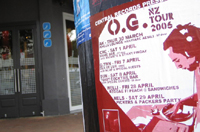Forget the National Front; I'm being stalked by David Cohen of the NBR. According to his perusal of 'the records' only one Mokling was born in New Zealand between 1975 and 1985 - a girl fortunate enough to be called 'Lena Mok'. According to David and subsequently a weekly gossip column, this was me.
So much for kidnapping as the pre-eminent Asian Crime. Identity fraud is where it's at. None of this is a very big deal, but hey, what's blogging for if not playing around with digital cameras and making trivial notes on ephemera? I don't know how it came to this, but I ended up emailing David a photo of my original birth-certificate.
Poor Lena Mok, where-ever she may be. I've googled her: she's either Dutch, a Hong Kong doctor, or a 41st percentile result-holder in the Canadian Mathematics Competition 2005. Other people I have been accused of being over the years: half-Balinese artist Sriwhana Spong, OG Chinese artist/animator Pippa Fay, Shortland Street actor Li-Ming Hu, television journalist Kim Webby, television journalist Bernadine Lim, and some girl called 'Ming' from the North Shore who once did theatresports. They are all nice people with no enemies; conversely I hate to think people are descending on innocent Lena Moks accusing them of being me.
And people can be really adamant about these things. I had this conversation sometime in the year 2000.
'You're Pippa, Pippa Fay.'
'No I'm not. I know her though, we have the same hairstyle right now.'
'No, you are Pippa.'
'No. I'm not.'
'Yes you are.'
'Um... do you want to see my student ID?'
Sort of like my exchange with David Cohen really.
When I was about six or seven I asked my mother why she hadn't given me or my brother an English name, not even an English middle-name. She shrugged: "Because you're not English?" She realised that I didn't have the vocabulary at that point to absorb a discourse on postcolonialism, but, being increasingly stabbed by the guilt of having burdened me with not only an unpronounceable but unspellable name, told me in a kind of pissed off way to choose an English name if I really wanted one. "But everyone already knows I'm Tze Ming!" I said, "I can't change it now!" She said that apparently, I could, people did it all the time. I had a think and quickly realised that like Anne of Green Gables who wanted to be called Cordelia one minute and Dorothea the next, I had a hyperactive imagination and would never be able to decide on one name if I had all the choice in the world. "It doesn't work like that, you have to give me the name," I said to my mother, "that's how people get names." She refused. Thanks mum. She knew she'd probably come up with something dorky, like 'Lena'.
There are several permutations of the non-English person/English name game. Something white people seem interested in, is the one of people rejecting the English name they were born with, and/or adopting a previously hidden (or entirely new) 'ethnic' or non-English name, whether they be Chinese, Maori, Samoan, Indian, African-American etc. Some of these people are making political identity statements, some are simply following culturally appropriate practice by which we adopt more formal names when careers advance into the public domain, some may be pitching their appeal to a specific market, and there are combinations of all those things. Certain white people project a level of snideness about this practice, as if they actually know something about ethnic authenticity - although really, if anyone has a right to be snide about this, they sure as hell don't.
There are also some Chinese people with English names only on their birth certificate, and whose Chinese names aren't documented in any official paperwork. In some cases this extends to their actual family name, which has been obscured by historical English-language bureaucratic systems, meaning that their entire Chinese name bears zero relation to their officially recorded name. This doesn't make their Chinese name any less their name. It's just 'secret'. Which both myself and Secret Asian Man think is pretty cool.
Then there is the newly adopted English name phenomenon, which comes in many categories. Here are just a few of them:
- your parents gave you the name on the plane over from Hong Kong. This can work out okay, right 'Keith'?
- you picked the name yourself on the plane over from Hong Kong. Lookin' at you, Candy Ho. People really shouldn't let eight-year olds choose their own names; although they do have a unique charm.
- you've adopted an English name for work purposes in your adult life because you're scared that no-one will look at your CV when you apply for jobs.
- you picked the name while taking part in your first English-language class back in China, because it was compulsory. Lookin' at you, 'Mirror', 'Black', 'Rainbow' and 'Starry'. These are my favourite kind, and I have one of my own.
In 2002 I taught one English class in China, where the school required all students AND teachers to adopt English names. The managers were puzzled that I didn't already have one, and were worried that the students' parents wouldn't believe that I was a 'real foreigner'. So for approximately four hours a week for three months, I adopted the name 'Zhora', after the Combat-model/exotic dancer Nexus 6 Replicant in Bladerunner. Ironically, my first time living long term in a country where everyone was able to say my name correctly, I was made to adopt an English name which my students couldn't actually pronounce.
